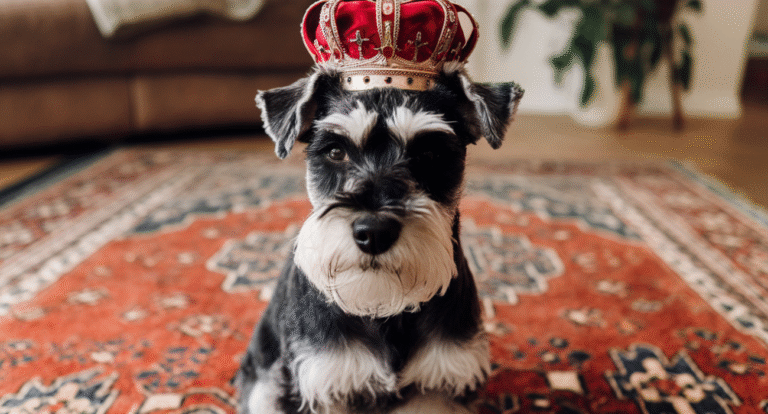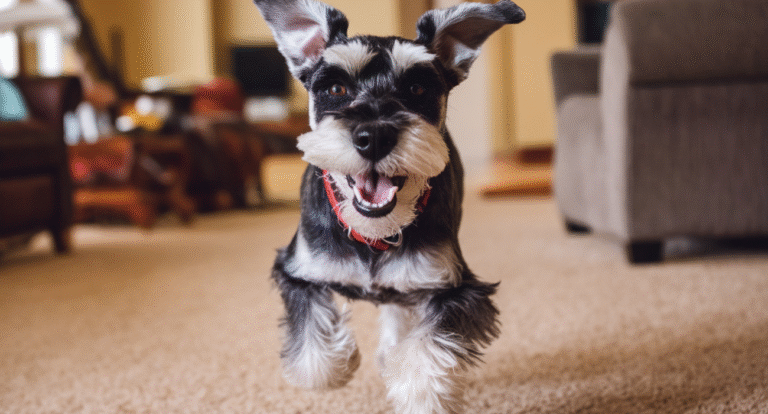Food really affects mood. Learn how diet choices can change your Schnauzer’s energy, attitude, and behavior.
Ever wonder why your Schnauzer seems extra grumpy after dinner or bizarrely hyperactive at bedtime? Turns out, you might want to check their food bowl before blaming it on personality quirks. The connection between canine nutrition and behavior is becoming impossible to ignore, and Schnauzers, with their distinctive bearded faces and bold attitudes, are particularly fascinating test subjects.
What’s landing in that ceramic dish isn’t just fuel. It’s essentially mood medication in kibble form, affecting everything from your pup’s anxiety levels to their ability to focus during training sessions.
The Science Behind the Food-Mood Connection
The relationship between diet and behavior isn’t just folk wisdom passed down from breeders. Real biochemical processes are happening inside your Schnauzer’s body every single time they eat. The gut produces approximately 90% of the body’s serotonin, that feel-good neurotransmitter that regulates mood, sleep, and anxiety levels. When the gut is happy, the brain follows suit.
Research in veterinary nutrition has exploded over the past decade, revealing connections that sound almost too simple to be true. Poor quality proteins, excessive carbohydrates, artificial additives, and lack of essential fatty acids can all conspire to create a behavioral mess. Your Schnauzer might not be stubborn or difficult; they might just be eating garbage.
The microbiome, that bustling city of bacteria living in your dog’s digestive system, plays a starring role here. These microscopic residents produce neurotransmitters, regulate inflammation, and communicate directly with the brain through what scientists call the gut-brain axis. Feed the good bacteria, and you’re essentially feeding better behavior.
Protein Quality: The Foundation of Stable Moods
Not all proteins are created equal, and your Schnauzer’s brain knows the difference. High-quality animal proteins provide amino acids like tryptophan, tyrosine, and phenylalanine, which serve as building blocks for neurotransmitters. Tryptophan converts to serotonin (hello, calm dog). Tyrosine becomes dopamine (motivation and focus). Phenylalanine transforms into norepinephrine (alertness and mood regulation).
When you fill their bowl with foods containing mystery meat, byproducts, or plant-based protein fillers, you’re shorting their neurological system. Schnauzers, being terriers at heart, already have plenty of natural spunk. Giving them the wrong protein sources can amplify that intensity into something less charming and more chaotic.
Your Schnauzer’s brain chemistry depends entirely on the quality of amino acids flowing through their system. Cheap protein equals cheap neurotransmitters, which equals unpredictable behavior.
Look for named meat sources: chicken, beef, lamb, fish. The ingredient list should read like something you’d recognize at a butcher shop, not a chemistry lab.
Omega Fatty Acids: Brain Food Isn’t Just a Saying
If proteins are the foundation, omega-3 fatty acids are the sophisticated architectural details that make everything work smoothly. DHA (docosahexaenoic acid) and EPA (eicosapentaenoic acid), primarily found in fish oils, are crucial for brain function and emotional regulation. Studies show that dogs with adequate omega-3 intake display reduced anxiety, better trainability, and improved cognitive function.
The typical commercial dog food is heavy on omega-6 fatty acids (from vegetable oils and poultry fat) and light on omega-3s. This imbalance can promote inflammation throughout the body, including the brain. Inflammation and good moods don’t exactly go hand in hand.
Adding quality fish oil or feeding fish-based proteins can dramatically shift this balance. Some Schnauzer owners report noticeable behavioral improvements within just a few weeks of omega-3 supplementation. Less reactive barking, better impulse control, decreased separation anxiety: the benefits read like a behavioral trainer’s wish list.
Carbohydrates and the Energy Rollercoaster
Carbs aren’t inherently evil, but the type and amount matter enormously. Simple carbohydrates (think corn, wheat, white rice) cause rapid blood sugar spikes followed by crashes. That cycle translates directly into behavioral fluctuations: hyperactivity followed by lethargy, or irritability when blood sugar plummets.
Complex carbohydrates from sweet potatoes, oats, or legumes release energy slowly and steadily. Your Schnauzer maintains consistent energy levels, which means more predictable behavior throughout the day. No more Jekyll and Hyde routine depending on how long it’s been since their last meal.
| Carbohydrate Type | Blood Sugar Impact | Behavioral Effect |
|---|---|---|
| Simple (corn, wheat, white rice) | Rapid spike and crash | Hyperactivity, then lethargy; irritability |
| Complex (sweet potato, oats, lentils) | Slow, steady release | Stable energy, consistent mood |
| Excessive carbs (any type) | Prolonged elevation, insulin issues | Anxiety, restlessness, weight gain |
Many commercial foods are loaded with cheap carbohydrate fillers because they’re inexpensive. Your wallet might appreciate it initially, but your sanity (and your Schnauzer’s mental health) will pay the price.
Additives, Preservatives, and Artificial Colors: The Behavioral Wildcards
Here’s where things get slightly terrifying. Many commercial dog foods contain artificial colors (because apparently humans buy food that looks appealing, even though dogs don’t care), chemical preservatives like BHA and BHT, and various mystery additives. Some of these substances have been linked to hyperactivity and behavioral problems in both humans and dogs.
Artificial colors serve absolutely zero nutritional purpose. They exist purely for marketing. Yet some dogs, Schnauzers included, can have sensitivity reactions that manifest as behavioral changes: increased reactivity, difficulty focusing, or even aggression. It’s like giving a kid a handful of candy with red dye #40 and expecting them to sit quietly.
If you can’t pronounce an ingredient and it sounds like it belongs in a science experiment rather than a food bowl, your Schnauzer’s brain probably doesn’t know what to do with it either.
Natural preservatives like mixed tocopherols (vitamin E) and rosemary extract are far gentler on the system. Reading labels becomes non-negotiable when you’re trying to optimize behavior through nutrition.
Specific Nutrients That Target Mood Regulation
Beyond the macronutrients, several specific vitamins and minerals directly influence canine behavior. B vitamins, particularly B6 and B12, are essential for neurotransmitter production. Deficiencies can lead to increased anxiety and poor stress management. Magnesium acts as nature’s relaxant, helping regulate the nervous system and promoting calmness.
Zinc plays a role in neurotransmitter function and immune health. L-theanine, an amino acid found in green tea (safe in appropriate forms for dogs), promotes relaxation without sedation. Tryptophan-rich foods naturally boost serotonin production. Some premium dog foods are now being formulated with these behavioral health components specifically in mind.
Probiotics deserve special mention here. These beneficial bacteria don’t just improve digestion; they directly influence mood through the gut-brain axis. Probiotic supplementation has shown promise in reducing anxiety-related behaviors in dogs, which is particularly relevant for Schnauzers who can be prone to separation anxiety.
The Schnauzer-Specific Considerations
Schnauzers, across all three sizes, share certain breed characteristics that make nutrition particularly important for behavioral management. They’re intelligent, sometimes stubborn, naturally alert (read: potentially reactive), and can develop anxiety issues if not properly managed. Their terrier heritage means they’ve got prey drive, determination, and opinions about everything.
These dogs benefit enormously from stable blood sugar, adequate protein, and anti-inflammatory nutrients. Their alert nature means they’re already primed to notice everything; poor nutrition can tip that vigilance into hypervigilance or reactivity. Their intelligence means they get bored easily, and blood sugar crashes or nutrient deficiencies can make that boredom morph into destructive behavior.
The bearded breed is also prone to certain health issues (pancreatitis, bladder stones, skin problems) that are directly influenced by diet. A food that manages both physical and mental health needs to be the goal.
Practical Changes You Can Make Today
Switching foods doesn’t mean you need to remortgage your house or become a canine nutritionist overnight. Start by reading ingredient lists critically. The first five ingredients matter most since they comprise the bulk of the food. Look for named meat sources, whole food carbohydrates, and minimal mystery ingredients.
Consider adding fresh, whole food toppers to existing kibble: a spoonful of plain pumpkin, some blueberries, a bit of cooked salmon, or some scrambled eggs. These additions provide fresh nutrients and can significantly boost the nutritional profile of even mediocre commercial food.
Small, consistent changes compound over time. Your Schnauzer’s brain and behavior will reflect the cumulative effect of better nutrition, not overnight miracles.
Omega-3 supplementation is relatively inexpensive and can be transformative. Quality fish oil (properly stored to prevent rancidity) might be the single best behavioral intervention available for the price. Work with your veterinarian on appropriate dosing.
Monitoring Changes and Keeping Records
When you modify your Schnauzer’s diet, keep a simple behavior journal. Note energy levels, reactivity, sleep quality, focus during training, and any anxiety indicators. Changes won’t be immediate or dramatic, but over 4-6 weeks, patterns should emerge. Better sleep might appear first, followed by improved focus, then reduced anxiety behaviors.
Be patient. The body needs time to adjust, the microbiome needs to rebalance, and neurotransmitter production needs to stabilize. Jumping from food to food every two weeks won’t give you useful information and might actually create additional digestive and behavioral stress.
If you’re dealing with serious behavioral issues (aggression, severe anxiety, compulsive behaviors), nutrition should be part of your management strategy alongside training, environmental management, and potentially veterinary behavioral consultation. Food is powerful, but it’s not magic. Think of it as providing the biochemical foundation that makes all other interventions more effective.






